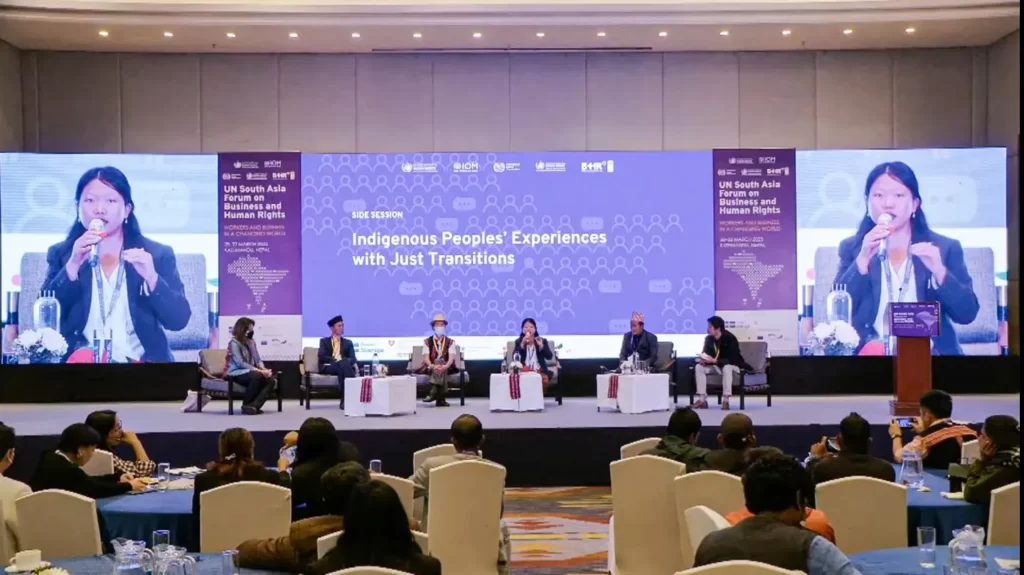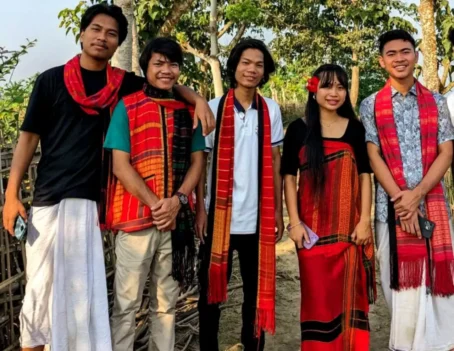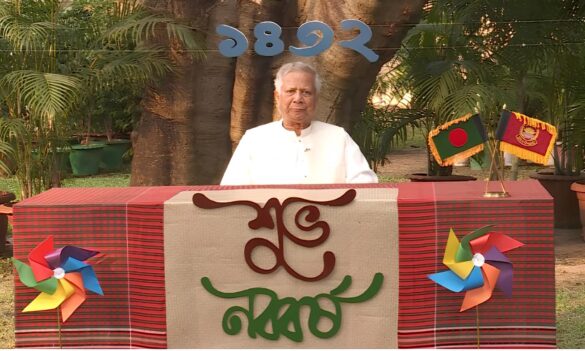Representatives from different organisations in Arunachal Pradesh, including Tasik Pangkam from the Siang Indigenous Farmer’s Forum (SIFF), and Bhanu Tatak and Ebo Mili from the Dibang Resistance and Indigenous Rights Advocacy Dibang (IRAD), attended the fourth edition of the United Nations Business and Human Rights Forum in Kathmandu, Nepal.
Pangkam took the opportunity to present a memorandum to Dr. Pichamon Yeophantong, the chair of the UN Working Group on Business and Human Rights. The memorandum addressed the concerns of the Siang Indigenous Farmer’s Forum (SIFF) regarding the construction of a 10,000 MW dam over the Siang river, highlighting the potential socioeconomic consequences associated with such mega dams. Pangkam emphasised the need to carefully consider the impacts on the community before implementing such large-scale development projects.
According to the president of SIFF, in the last 13 years, the forum has made representations to various entities such as the high court, prime minister of India, Arunachal government, Arunachal governor, and the Human Rights Commission of Assam.
Tasik Pangkam emphasised that the Adis of Siang cannot approve of the 10,000 MW dam proposed in their ancestral territory, as it poses a significant threat to their existence and identity. Pangkam also urged the UN working group, international environmental and indigenous people’s agencies, as well as downstream Assam and Bangladesh, to assist in opposing and cancelling the proposed 10,000 MW dam over the Siang river.
Bhanu Tatak presented three cases of hydropower projects in Arunachal Pradesh: the 2,880 MW Dibang multipurpose hydroelectric project (HEP), the 10,000 MW Siang HEP, and the recently cancelled 3,097 MW Etalin HEP in its current form.
Tatak also pointed out the poor track record of the National Hydroelectric Power Corporation (NHPC) in violating indigenous people’s rights in states such as Sikkim, Assam, Manipur, and Arunachal Pradesh in the northeast region of India.
She further informed the forum that a public interest litigation filed by the SIFF in the Gauhati High Court’s Itanagar permanent bench had received jurisdiction in their favour. However, despite this, the NHPC is still conducting surveys and studies across the Siang river without the consent of the local people, Tatak added.
In addition, Bhanu Tatak raised concerns about the 2,880 MW Dibang multipurpose dam and the lack of availability of its climate feasibility and downstream impact assessment report. Despite the non-feasibility of such mega dams, Tatak expressed concern over why the Indian government is still pursuing them.
Furthermore, Tatak touched upon the climate anxieties of the future and highlighted the Kaptai hydroelectric project in Bangladesh, which displaced the indigenous Chakmas and forced them to become climate migrants in indigenous territories of Arunachal. This situation has led to unwanted confrontations between both vulnerable communities. Tatak also addressed the arrest of Mili and Neelim Mahanta, who were apprehended for spray-painting the words “NO MORE DAMS” on the civil secretariat wall in Itanagar.
“Violation of human rights and indigenous people’s right to self-determination is a cause of concern in the dialogue of hydropower in Arunachal Pradesh, where more than 200 MoUs were signed by the government of Arunachal Pradesh with private sector and PSUs without any consultation or consent from the natives/indigenous of the region,” she said.
The UN South Asia Forum on Business and Human Rights was held from 22-23 March, and attendees discussed challenges faced by workers and employees in Asia, as well as violations of human rights associated with it. Participants included representatives from civil society organisations, governments, and businesses across South Asia, who shared their respective country’s actions to promote and follow the guidelines of the United Nations Guiding Principles on Business and Human Rights, as well as the International Labour Organisation.
During the forum, concerns were raised about the violation of human rights and indigenous people’s right to self-determination in the dialogue of hydropower in Arunachal Pradesh. The region has signed over 200 MoUs with private sector and PSUs without consultation or consent from the natives/indigenous of the region, potentially displacing more than 1 million lives in Arunachal and downstream Assam.
Source: The Arunachal Times







